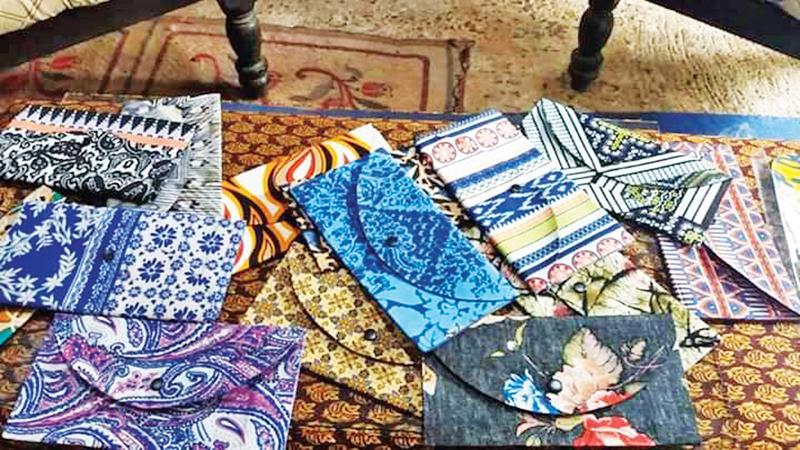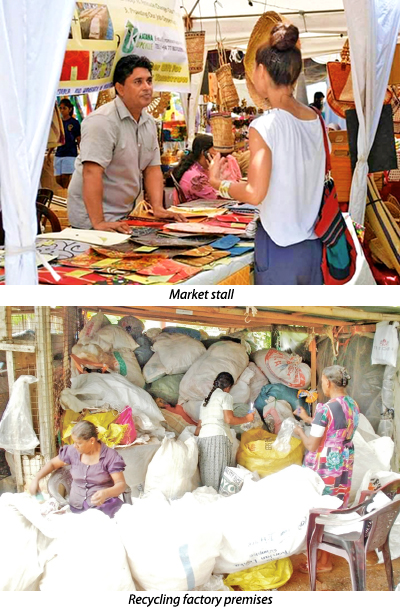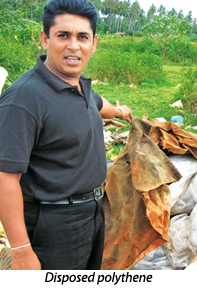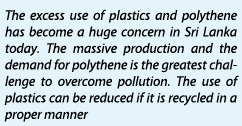
Humans have been tormenting the earth ever since technology emerged by destructing it with chemicals, waste, toxic gas, deforestation, etc. and Nature has been responding to mankind with its worst answers. This ‘never ending process’ has created deadly repercussions which affect every inch of the earth, as well as all living beings. Land pollution due to non degradable waste materials not being properly disposed has impacted negatively on the earth. Sri Lanka, at one time known as the Pearl of the Indian Ocean was a victim of pollution that caused many deaths due to the collapse of a garbage mountain a few years ago. Still the problem exists in different parts of the country in different forms.

 Jayantha Kumarasiri of Katana, founder and director of Romesha Polymer Industries has invented a novel way of manufacturing products out of non recyclable plastics and polythene. Jayantha revealed to the Sunday Observer how he initiated manufacturing items using non recyclable material.
Jayantha Kumarasiri of Katana, founder and director of Romesha Polymer Industries has invented a novel way of manufacturing products out of non recyclable plastics and polythene. Jayantha revealed to the Sunday Observer how he initiated manufacturing items using non recyclable material.
“The excess use of plastics and polythene has become a huge concern in Sri Lanka today. The massive production and the demand for polythene is the greatest challenge to overcome pollution. The use of plastics can be reduced if it is recycled in a proper manner. I started thinking about ways to avoid dumping waste containing polythene and plastic on land. The idea of manufacturing products occurred to me by studying how other countries overcome the problem of such waste.
I decided to make use of the knowledge I gained in the past years working at polythene manufacturing industries, to produce reusable items from non recyclable polythene” said Jayantha. Polythene that are food contaminated, and those manufactured by mixing with other materials are rejected in the recycling process. According to Jayantha, the ‘non recyclable polythene’ is directed to dumping sites, thereby increasing the bulk of Municipal waste. Jayantha hopes to put his innovative ideas into practice with the help of IUCN (International Union of Conservation of Nature), Western Australia University, and the Central Environment Authority.
‘The IUCN organization and the ‘Waste for Life Project’ by Western Australia University helped me with the machines, technology and knowledge required to activate a recycling factory. At present I can recycle 15-20 tons of polythene per month with a staff of 75 members. I consider this process as an act of changing polythene’s life cycle from cradle to grave. Recycled products such as box files, envelopes, book covers, table mats, files and ceiling sheets reached the market after years of experiment and hard work.
These products are available and could be purchased at Good Market in Colombo 7. I would be grateful to all who buy these products as they would contribute in saving nature for the future” he said. Jayantha says his products are affordable, long lasting and could be recycle repeatedly.
 His continuous contribution towards expanding the industry is a step forward to introduce more products. The plywood sheet introduced by Jayantha contrasts with the traditional plywood sheet due to its outstanding qualities such as durability of 10 to 15 years, water proof, heat controller and resistant to pests.
His continuous contribution towards expanding the industry is a step forward to introduce more products. The plywood sheet introduced by Jayantha contrasts with the traditional plywood sheet due to its outstanding qualities such as durability of 10 to 15 years, water proof, heat controller and resistant to pests.
Hopefully, Jayantha would soon introduce tables and chairs manufactured out of recycled polythene and plastics, paving the way to combat the continuous problem of waste.
At present the project has reached out to 3,000 students and 25 community groups in the district, thus increasing awareness on the dangers of pollution and the importance of recycling waste. In addition, the systematic collection and recycling of waste has become a main income source for the people in his area. Jayantha’s attempt is a creative solution which addresses the problem of waste disposal and reveals the hidden value for waste products. Sri Lanka will possibly be a green country with zero waste if every citizen including our leaders are responsible for what is disposed to the environment and where it ends.
